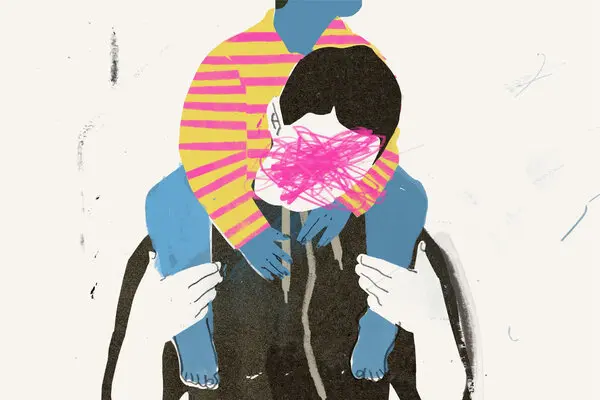Did you know that postpartum depression can affect men too? It’s a condition that is often overlooked, but it can be just as serious for men as it is for women. In this blog post, we will discuss the signs and symptoms of postpartum depression in men, as well as the treatments available. If you think you or someone you know might be suffering from this condition, please don’t hesitate to reach out for help!
Contents
- 1 Defining Postpartum Depression In Men
- 2 Signs and Symptoms
- 3 Causes and Risk Factors
- 3.1 A history of depression or anxiety
- 3.2 Stressful life events
- 3.3 Lack of social support
- 3.4 Gender roles
- 3.5 Poor guidance
- 3.6 Single parenthood/Co-parenting
- 3.7 Previous trauma
- 3.8 Perinatal losses
- 3.9 Sleep deprivation
- 3.10 Hormonal changes
- 3.11 Medical conditions
- 3.12 Having a baby with health problems
- 3.13 Use of certain medications
- 4 Consequences
- 5 Treatment
- 6 Conclusion
Defining Postpartum Depression In Men
When we think of postpartum depression, we often think of it as a condition that only affects women. However, this is not the case. Postpartum depression can affect anyone who has recently become a parent, regardless of gender. So what is postpartum depression? According to science, it is “a type of clinical depression that can occur in men or women after the birth of a child.”
It is an estimate that up to one in every ten fathers experience some form of postpartum depression (PPD). That’s right, dads get PPD too. While it is commonly thought that PPD only affects mothers, the reality is that fathers can also suffer from this condition. And, unfortunately, due to the stigma surrounding mental health in men, many fathers suffering from PPD do not seek help.
While new mothers may face depressive symptoms for obvious reasons such as sleep deprivation and hormonal changes, fathers may also suffer from depression due to a number of factors that tend to be overlooked.
Postpartum depression is different from the “baby blues” in that it is more severe and lasts longer than a few weeks. It can also interfere with your ability to care for your child and enjoy time with your family. If you are suffering from postpartum depression, it is important to seek help from a mental health professional.
Signs and Symptoms
Postpartum depression in men may or may not present itself in the same way as it does in women. However, there are some common signs and symptoms to look out for. These can be characterized into three main categories: physical, emotional, and behavioral. These can entail the following:
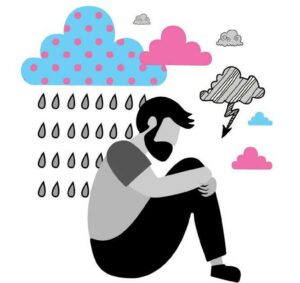
Physical signs
- Fatigue or decreased energy levels
- Loss of interest in sex
- Insomnia or sleeping too much
- Headaches
- Chest pain
- Gastrointestinal problems
Emotional signs
- Feeling sad, anxious, or empty
- Feeling hopeless or helpless
- Constant guilt or worthlessness for no apparent reason
- Aggressive behavior
- Nervousness or feeling on edge
- Having low self-esteem
Behavioral signs
- Withdrawal from friends and family
- Difficulty bonding with the baby
- Fights with partner
- Poor concentration and memory
- Neglecting personal care
- Decreased interest in hobbies
- Poor performance at work
- Alcohol or drug abuse
All of these signs can be indicative of postpartum depression, but it is important to keep in mind that not everyone will experience all of them. If you are experiencing any of these symptoms, please reach out for help!
Causes and Risk Factors
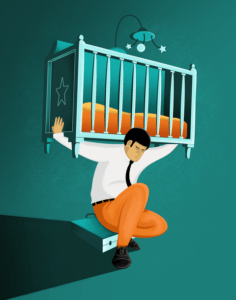
There is no single cause of postpartum depression in men, but there are several risk factors that may make you more susceptible to developing the condition. These can include:
A history of depression or anxiety
If you have a history of mental illness, you may be more likely to experience postpartum depression. This is because the existing conditions may be exacerbated by the stress of becoming a parent. They may also be less likely to respond to traditional treatments.
Stressful life events
If you have experienced any major life changes in the past year, such as a death in the family or a job loss, you may be at an increased risk for postpartum depression. This is because these events can trigger a depressive episode. Additionally, if you are struggling to adjust to parenthood, this can also lead to depression.
If you do not have a strong network of family and friends, you may be more likely to experience postpartum depression. This is because social support can help buffer against the stress of becoming a parent. Additionally, if you do not have a partner, you may also be at an increased risk for postpartum depression.
Gender roles
Gender roles can play a role in postpartum depression. This is because mothers are typically the primary caretakers of their children. This can lead to feelings of isolation and inadequacy. Additionally, fathers may feel like they are not contributing enough to their family or that they are not “manly” enough. Furthermore, society’s expectations of mothers and fathers can also lead to stress and anxiety.
Poor guidance
If you did not have a good role model growing up, you may be more likely to experience postpartum depression. This is because you may not have learned how to deal with the stress of becoming a parent. Additionally, if you were raised in a chaotic or abusive home, this can also lead to postpartum depression.
Single parenthood/Co-parenting
In an event where the mother is not in the picture or the father is co-parenting with someone else, this can lead to feelings of isolation and anxiety. This is because they may feel like they are not doing enough or that they are not “good enough.” This can also lead to role confusion and conflict.
Previous trauma
If you have experienced any previous trauma, such as abuse or neglect, you may be more likely to experience postpartum depression. This is because the trauma can trigger a depressive episode. Additionally, if you are struggling to cope with the trauma, this can also lead to depression.
Perinatal losses
If you have experienced a perinatal loss, such as a miscarriage or stillbirth, you may be at an increased risk for postpartum depression. This can also include any difficulties or complications during childbirth such as a traumatic birth experience. While fathers may not be directly affected by it, the guilt and grief from the loss can still lead to depression.
Sleep deprivation
It is no secret that being a new parent can be exhausting. And, if you are not getting enough sleep, it can lead to postpartum depression. This is because sleep deprivation can cause irritability, anxiety, and fatigue. It can also impair your ability to think clearly and make decisions.
Hormonal changes
Hormones are one of the biggest contributors to postpartum depression. This is because the hormonal changes that occur during pregnancy and after childbirth can lead to mood swings and irritability. Additionally, these changes can also affect your sleep, energy levels, and appetite.
Medical conditions
There are certain medical conditions that can increase your risk for postpartum depression. These include thyroid disorders, diabetes, and preeclampsia. Additionally, if you have a history of postpartum depression, you may be more likely to experience it again with subsequent births.
Having a baby with health problems
Sometimes, even if everything goes according to plan, you may still end up with a baby with health problems. This can lead to feelings of guilt, inadequacy, and failure. Additionally, the stress of caring for a sick child can also trigger postpartum depression.
Use of certain medications
Certain medications, such as those for fertility or pain relief, can increase your risk for postpartum depression. This is because they can cause hormonal changes that can lead to mood swings and irritability. Additionally, these medications can also affect your sleep, energy levels, and appetite.
If you have any of these risk factors, it does not mean that you will definitely develop postpartum depression. However, it is important to be aware of them so that you can be on the lookout for any signs or symptoms. If you are experiencing any of the following, it is important to seek help from a mental health professional.
Consequences
All of the signs and causes may have severe consequences if not taken care of. The parents may suffer, the child may suffer, and the entire family dynamic can be changed for the worse. Some of these consequences could include:
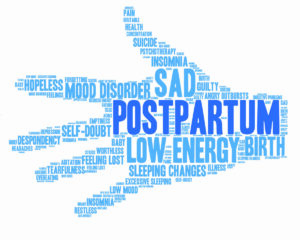
- The parent suffering from depression may begin to feel hopeless, helpless, and lose interest in activities they used to enjoy.
- The parent may also start to have thoughts of harming themselves or their child. This can lead to emotional unavailability or abusive behaviors, which in turn can adversely affect the child’s development and future relationships.
- The non-depressed parent may feel overwhelmed and resentful. This can lead to feelings of guilt, which can further worsen the depression. This can even lead to disparities and fights between the parents.
- The quality of parenting may suffer as the depressed parent has less energy and patience. The child may suffer from developmental delays or behavioral problems if their parent is suffering from postpartum depression.
- The child may begin to feel neglected if the parent is not as attentive. This can also make the child start to display behavioral problems.
- The family dynamic can be severely impacted as the parents fight more, withdraw from each other, and have less time for each other.
All of these after-effects can be prevented with early recognition and treatment of postpartum depression. So, if you are a new parent, don’t hesitate to reach out for help if you are feeling any of the above symptoms. Postpartum depression is a real and serious condition that should not be ignored.
Treatment
As stated before, fathers may experience postpartum depression even though they did not give birth themselves. However, this is often overlooked because of the stereotype that only mothers can suffer from postpartum depression.
It is important for fathers to seek help if they are experiencing any signs or symptoms of postpartum depression. There are many resources available for fathers suffering from postpartum depression. With proper treatment, most fathers are able to recover from postpartum depression and go on to have healthy relationships with their children.
Some of the most common treatments for postpartum depression include either professional intervention or self-care strategies.
Professional Help
Consulting a mental health professional is one of the most effective ways to treat postpartum depression. A therapist can help you understand your thoughts and feelings, as well as provide coping and problem-solving strategies.
Therapy can happen individually, or in a group setting. There are also many online resources available, such as support groups and forums. Some of the most common types of therapy include:

- Cognitive-behavioral therapy: This type of therapy can help you identify and change negative thought patterns.
- Interpersonal therapy: This type of therapy can help improve communication skills and resolve conflict in relationships.
- Psychodynamic therapy: This type of therapy explores the role of past experiences in present problems.
- Narrative therapy: This type of therapy helps you to change the story you tell yourself about your life.
- Expressive therapy: This type of therapy uses creative outlets, such as art, music, or writing, to express emotions.
- Couples counseling: This type of therapy can help improve communication and resolve conflict in relationships.
- Support groups: There are many support groups available for fathers suffering from postpartum depression. These groups provide a safe and supportive environment to share your experiences and connect with other fathers who are going through similar things.
In addition to therapy, you may also be recommended for medications. The most common type of medication used to treat postpartum depression include:
- Selective serotonin reuptake inhibitors (SSRIs): These drugs work by increasing levels of serotonin in the brain. Serotonin is a neurotransmitter that helps regulate mood.
- Serotonin and norepinephrine reuptake inhibitors (SNRIs): These drugs work by increasing levels of both serotonin and norepinephrine in the brain. These neurotransmitters help regulate mood and energy levels.
- Tricyclic antidepressants (TCAs): These drugs work by increasing levels of norepinephrine and serotonin in the brain.
- Monoamine oxidase inhibitors (MAOIs): These drugs work by preventing the breakdown of neurotransmitters in the brain.
- Antipsychotic medications: These drugs are typically used to treat psychosis, but they can also be effective in treating postpartum depression.
It is important to consult with a mental health professional before starting any medications, as there are potential risks and side effects associated with them.
Self-care Strategies
In addition to professional help, there are also many self-care strategies that can be effective in treating postpartum depression in men. Some self-care strategies that may be helpful include:
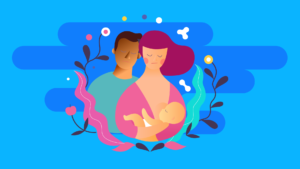
- Exercise: Exercise has been shown to be an effective treatment for depression. It can help improve mood, sleep, and energy levels.
- Healthy diet: Eating a healthy diet can also help improve mood and energy levels.
- Stress management: Managing stress can be helpful in treating postpartum depression. Some stress management techniques include yoga, meditation, and relaxation exercises.
- Sleep: Getting enough sleep is important for overall health and well-being. It can also help improve mood and energy levels.
- Build healthy coping mechanisms: Identifying and using healthy coping mechanisms can help you to better manage stress and cope with difficult emotions. Some healthy coping mechanisms include journaling, deep breathing, and progressive muscle relaxation.
- Find the right support: Finding a support system of friends, family, or other fathers who are going through similar experiences can be helpful.
Postpartum depression is a serious condition that should not be ignored. If you are experiencing any of the symptoms, please seek professional help. There are many effective treatments available, and you don’t have to suffer in silence.
Conclusion
Postpartum depression in men is a real and serious condition that is often underestimated and misunderstood. While it is more commonly discussed in relation to women, it is important to remember that men can also suffer from this condition. If you are a father who is experiencing any of the symptoms of postpartum depression, please seek professional help. There are many effective treatments available, and you don’t have to suffer in silence. With the right treatment and support, you can recover from postpartum depression and go on to lead a happy and healthy life.
For more information, please contact MantraCare. Depression is a mental illness characterized by persistent feelings of sadness, hopelessness, and loss of interest in daily activities. If you have any queries regarding Online Depression Counseling experienced therapists at MantraCare can help: Book a trial Depression Therapy session
